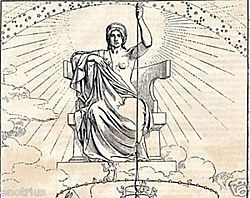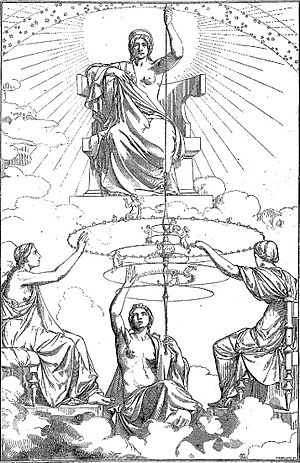Ananke facts for kids
Quick facts for kids Ananke |
|
|---|---|
| Personification of Necessity and Inevitability | |
| Member of the Greek primordial deities | |

|
|
| Other names | Adrastea |
| Abode | The cosmos |
| Symbol | torch, spindle |
| Personal information | |
| Consort | Chronos |
| Offspring | |
| Parents | self-formed |
| Siblings | |
| Roman equivalent | Necessitas |
In ancient Greek religion, Ananke (pronounced "uh-NANG-kee") is a very old and powerful goddess. Her name comes from an ancient Greek word meaning "force," "constraint," or "necessity." She is the personification of things that are unavoidable and must happen, like fate. People often imagined her holding a spindle, a tool used for spinning thread.
Ananke is one of the first gods, known as the primordial deities. She and her partner, Chronos (who represents time), were believed to have appeared at the very beginning of creation. Their arrival marked the change from a state of chaos to an organized universe. Ananke was seen as the strongest ruler of fate and circumstances. Both gods and humans respected her power and honored her. Some stories say she is the mother of the Fates, and that she was the only one who could influence their decisions.
The ancient Greek traveler Pausanias wrote about a temple in ancient Corinth. In this temple, the goddesses Ananke and Bia (meaning "force" or "violence") were worshipped together. Ananke is also sometimes linked to Aphrodite, especially Aphrodite Urania. This version of Aphrodite represents a more abstract, heavenly love. Both Ananke and Aphrodite Urania were seen as powerful forces that guided life. Ananke's Roman equivalent, or counterpart, is Necessitas, which also means "necessity."
Contents
What Does the Name Ananke Mean?
The name "Ananke" comes from the ancient Greek word "ἀνάγκη." This word means "force," "constraint," or "necessity." Even in the writings of Homer, an ancient Greek poet, the word was used to mean "it is necessary to fight" or "by force."
In ancient Greek literature, the word also meant "fate" or "destiny." It could also mean "compulsion" or "torture by a superior power." The poet Simonides wrote, "Even the gods don't fight against ananke." This shows how powerful she was believed to be.
Ananke in Ancient Greek Stories
In a set of ancient Greek beliefs called Orphic mythology, Ananke was a being who formed herself at the start of creation. She was described as having a snake-like shape, with her arms stretching around the entire universe. Ananke and Chronos were partners, wrapping around the universe like snakes.
Together, they crushed the first egg of creation. From this egg came the earth, sky, and sea, forming the organized universe. Ananke is also sometimes said to be the mother of Adrasteia, who gives out rewards and punishments.
Ananke and the Fates
The Greek philosopher Plato, in his book Republic, wrote about the parents of the Moirai, also known as the Fates. He said:
And there were another three who sat round about at equal intervals, each one on her throne, the Moirai (Moirae, Fates), daughters of Ananke, clad in white vestments with filleted heads, Lakhesis (Lachesis), and Klotho (Clotho), and Atropos (Atropus), who sang in unison with the music of the Seirenes, Lakhesis singing the things that were, Klotho the things that are, and Atropos the things that are to be . . . Lakhesis, the maiden daughter of Ananke (Necessity).

Aeschylus, a famous Greek writer of tragedies, also wrote about Ananke in his play Prometheus Bound. In this play, the Fates are called the "helmsman" (or guide) of the goddess Ananke. Prometheus, a character in the play, says that his suffering is unavoidable because of Ananke. He states that "Skill is weaker by far than Ananke (Necessity)."
The chorus then asks, "Who then is the helmsman of Ananke (Necessity)?" Prometheus replies, "The three-shaped Moirai (Fates) and mindful Erinyes (Furies)." This shows that even the powerful god Zeus could not escape what Ananke had determined.
Ananke in Modern Thought
The word "Ananke" has also appeared in later philosophical ideas and literature. For example, in Victor Hugo's novel Notre-Dame of Paris, the word "Ananke" is written on a wall. Hugo also used Ananke to represent different kinds of "necessity" or unavoidable forces that affect people's lives.
Sigmund Freud, a famous psychologist, mentioned Ananke in his work. He saw Ananke as representing the "exigencies of reality," meaning the demands and necessities of real life.
The poet Wallace Stevens and the scientist Norbert Wiener also used the idea of Ananke in their works. Wiener contrasted Ananke (representing scientific determinism, where everything is set) with Tyche (representing quantum indeterminacy, where things are uncertain).
Robert Bird, an essayist, and Vyacheslav Ivanov, a poet, have also explored the concept of Ananke. They suggest that ancient Greeks saw Ananke as an absolute, unavoidable force. She was seen as a powerful goddess of both love and destruction, representing memory and Mother Earth.
See also
 In Spanish: Ananké (mitología) para niños
In Spanish: Ananké (mitología) para niños
 | May Edward Chinn |
 | Rebecca Cole |
 | Alexa Canady |
 | Dorothy Lavinia Brown |

